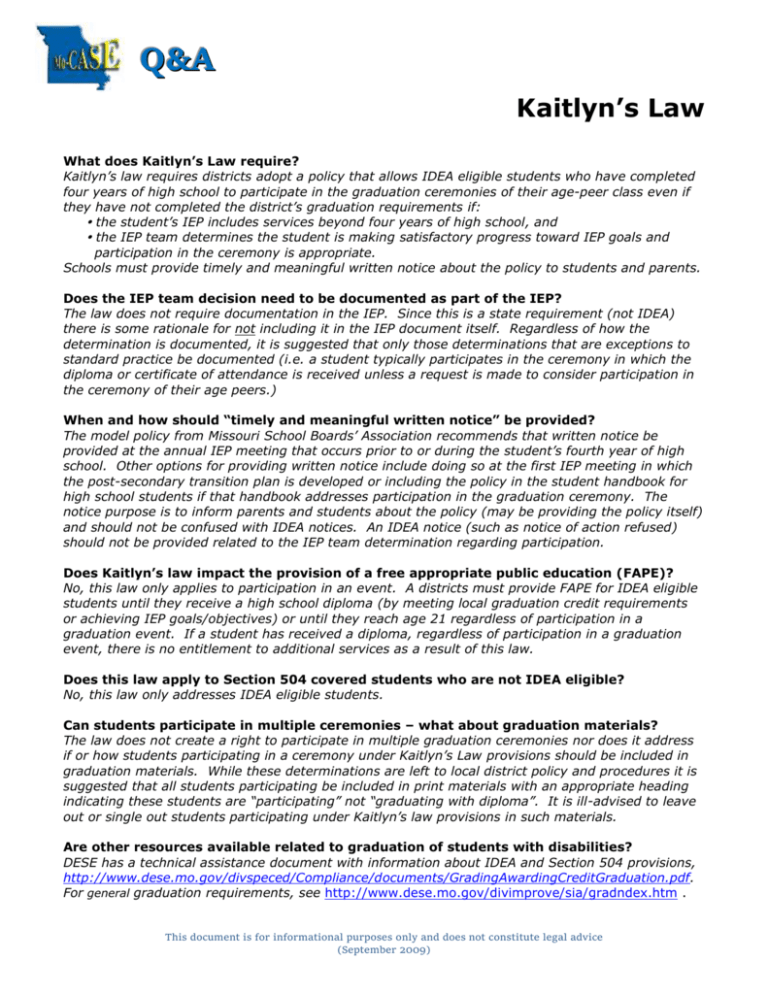Kaitlyn`s Law Q&A - Mo-Case
advertisement

Q&A Kaitlyn’s Law What does Kaitlyn’s Law require? Kaitlyn’s law requires districts adopt a policy that allows IDEA eligible students who have completed four years of high school to participate in the graduation ceremonies of their age-peer class even if they have not completed the district’s graduation requirements if: the student’s IEP includes services beyond four years of high school, and the IEP team determines the student is making satisfactory progress toward IEP goals and participation in the ceremony is appropriate. Schools must provide timely and meaningful written notice about the policy to students and parents. Does the IEP team decision need to be documented as part of the IEP? The law does not require documentation in the IEP. Since this is a state requirement (not IDEA) there is some rationale for not including it in the IEP document itself. Regardless of how the determination is documented, it is suggested that only those determinations that are exceptions to standard practice be documented (i.e. a student typically participates in the ceremony in which the diploma or certificate of attendance is received unless a request is made to consider participation in the ceremony of their age peers.) When and how should “timely and meaningful written notice” be provided? The model policy from Missouri School Boards’ Association recommends that written notice be provided at the annual IEP meeting that occurs prior to or during the student’s fourth year of high school. Other options for providing written notice include doing so at the first IEP meeting in which the post-secondary transition plan is developed or including the policy in the student handbook for high school students if that handbook addresses participation in the graduation ceremony. The notice purpose is to inform parents and students about the policy (may be providing the policy itself) and should not be confused with IDEA notices. An IDEA notice (such as notice of action refused) should not be provided related to the IEP team determination regarding participation. Does Kaitlyn’s law impact the provision of a free appropriate public education (FAPE)? No, this law only applies to participation in an event. A districts must provide FAPE for IDEA eligible students until they receive a high school diploma (by meeting local graduation credit requirements or achieving IEP goals/objectives) or until they reach age 21 regardless of participation in a graduation event. If a student has received a diploma, regardless of participation in a graduation event, there is no entitlement to additional services as a result of this law. Does this law apply to Section 504 covered students who are not IDEA eligible? No, this law only addresses IDEA eligible students. Can students participate in multiple ceremonies – what about graduation materials? The law does not create a right to participate in multiple graduation ceremonies nor does it address if or how students participating in a ceremony under Kaitlyn’s Law provisions should be included in graduation materials. While these determinations are left to local district policy and procedures it is suggested that all students participating be included in print materials with an appropriate heading indicating these students are “participating” not “graduating with diploma”. It is ill-advised to leave out or single out students participating under Kaitlyn’s law provisions in such materials. Are other resources available related to graduation of students with disabilities? DESE has a technical assistance document with information about IDEA and Section 504 provisions, http://www.dese.mo.gov/divspeced/Compliance/documents/GradingAwardingCreditGraduation.pdf. For general graduation requirements, see http://www.dese.mo.gov/divimprove/sia/gradndex.htm . This document is for informational purposes only and does not constitute legal advice (September 2009)





